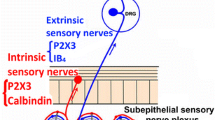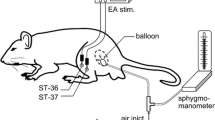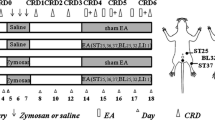Abstract
Objective
To observe the effect of electroacupuncture (EA) on the expressions of colonic nerve growth factor (NGF) and nerve growth factor receptor (NGFR) in visceral hypersensitivity rats, and investigate the mechanisms of EA on chronic visceral hypersensitivity.
Methods
A total of 24 neonatal rats were randomly divided into a normal group, a model group and an EA group. The models of visceral hypersensitivity rats were prepared according to the method of Al-Chaer. The rats in the EA group were treated with EA at Tianshu (ST 25) and Shangjuxu (ST 37), 20 min for each time, once a day, for 7 consecutive days. After the first treatment, the observation of abdominal withdrawal reflex (AWR) was used to evaluate the pain threshold of visceral hypersensitivity rats. After 7-day treatments, the colonic tissue of rat was collected to test the immunohistochemistry of NGF and NGFR.
Results
The score of AWR in the model group was higher than that in the normal group, but the score decreased after EA treatment. The positive expressions of colonic NGF and NGFR in the model group were increased than those in the normal group (P<0.05), while they were both decreased in the EA group after treatment (P<0.001).
Conclusion
The EA could up-regulate the pain threshold of visceral hypersensitivity rats, and down-regulate the expressions of colonic NGF and NGFR. The regulation of the expressions of colonic NGF and NGFR would be one of the peripheral mechanisms of EA in treating chronic visceral hypersensitivity.
摘要
目的
观察电针对内脏高敏感大鼠结肠神经生长因子(nerve growth factor, NGF)和神经生长因子受体(nerve growth factor receptor, NGFR)表达的影响, 探讨电针治疗慢性内脏高敏感性的作用机制。
方法
将24只新生乳鼠随机分为正常组、 模型组和电针组。 参照Al-Chaer法制备内脏高敏感性大鼠模型。 电针组予电针天枢、 上巨虚治疗, 每次20分钟, 每天1次, 连续7天。 首次治疗后, 通过观察大鼠腹壁撤回反射(abdominal withdrawal reflex, AWR)评分以评价内脏高敏感性大鼠的痛阈。 治疗7天后, 采集大鼠结肠组织进行NGF和NGFR免疫组织化学检测。
结果
模型组大鼠的AWR评分均高于正常组, 经电针治疗后均降低。 模型组大鼠的结肠NGF和NGFR阳性表达较正常组显著增加(P<0.05), 电针组治疗后NGF和NGFR阳性表达均显著降低(P<0.001)。
结论
电针可使内脏高敏感性大鼠的痛阈升高, 并降低结肠的NGF和NGFR表达。 电针对结肠NGF 和NGFR 表达的调节可能是其治疗慢性内脏高敏感性的外周作用机制之一。
Similar content being viewed by others
References
Mertz H, Naliboff B, Munakata J, Niazi N, Mayer EA. Altered rectal perception is a biological marker of patients with irritable bowel syndrome. Gastroenterology, 1995, 109(1): 40–52.
Cervero F, Laird JM. Visceral pain. Lancet, 1999, 353(9170): 2145–2148.
Xu XX, Li DG. Epidemiological characteristics of Irritable bowel syndrome. Zhonghua Liuxingbingxue Zazhi, 2003, 6(6): 523.
Li YQ, Yu YB. Research progress of nerve immune-regulation on irritable bowel syndrome abdominal pain. Guoji Xiaohuabing Zazhi, 2012, 32(2): 65–67.
Zhang YH, Nicol GD. NGF-mediated sensitization of the excitability of rat sensory neurons is prevented by a blocking antibody to the p75 neurotrophin receptor. Neurosci Lett, 2004, 366(2): 187–192.
Pannese E, Procacd P. Ultrastructural localization of NGF receptors in satellite cells of the rat spinal ganglia. J Neurocytol, 2002, 31(8–9): 755–763.
Metcalfe DD, Baram D, Mekori YA. Mast cells. Physiol Rev, 1997, 77(4): 1033–1079.
Matricon J, Muller E, Accarie A, Meleine M, Etienne M, Voilley N, Busserolles J, Eschalier A, Lazdunski M, Bourdu S, Gelot A, Ardid D. Peripheral contribution of NGF and ASIC1a to colonic hypersensitivity in a rat model of irritable bowel syndrome. Neurogastroenterol motil, 2013, 25(11): e740–e754.
Cui KM, Li WM, Gao X, Chung K, Chung JM, Wu GC. Electroacupuncture relieves chronic visceral hyperalgesia in rats. Neurosci Lett, 2005, 376(1): 20–23.
Tian XY, Bian ZX, Hu XG, Zhang XJ, Liu L, Zhang H. Electro-acupuncture attenuates stress-induced defecation in rats with chronic visceral hypersensitivity via serotonergic pathway. Brain Res, 2006, 1088(1): 101–108.
Tian SL, Wang XY, Ding GH. Repeated electro-acupuncture attenuates chronic visceral hypersensitivity and spinal cord NMDA receptor phosphorylation in a rat irritable bowel syndrome model. Life Sci, 2008, 83(9–10): 356–363.
Wu HG, Jiang B, Zhou EH, Shi Z, Shi DR, Cui YH, Kou ST, Liu HR. Regulatory mechanism of electroacupuncture in irritable bowel syndrome: preventing MC activation and decreasing SP VIP secretion. Dig Dis Sci, 2008, 53(6): 1644–1651.
Delafoy L, Raymond F, Doherty AM, Eschalier A, Diop L. Role of nerve growth factor in the trinitrobenzene sulfonic acid-induced colonic hypersensitivity. Pain, 2003, 105(3): 489–497.
Talley NJ, Boyce PM, Jones M. Predictors of health care seeking for irritable bowel syndrome: a population based study. Gut, 1997, 41(3): 394–398.
Sugai GC, Freire Ade O, Tabosa A, Yamamura Y, Tufik S, Mello LE. Serotonin involvement in the electro-acupuncture- and moxibustion-induced gastric emptying in rats. Physiol Behav, 2004, 82(5): 855–861.
Al-Chaer ED, Kawasaki M, Pasricha PJ. A new model of chronic visceral hypersensitivity in adult rats induced by colon irritation during postnatal development. Gastroenterology, 2000, 119(5): 1276–1285.
Drossman DA, Patrick DL, Whitehead WE, Toner BB, Diamant NE, Hu Y, Jia H, Bangdiwala SI. Further validation of the IBS-QOL: a disease-specific quality-of-life questionnaire. Am J Gastroenterol, 2000, 95(4): 999–1007.
Wu HG, Zhao C, Shi Z, Chen HP, Liu Y, Liu SM. Clinical study on spleen-stomach-reinforcing moxibustion treatment of diarrhea-type irritable bowel syndrome. Shijie Zhenjiu Zazhi, 2002, 12(1): 10–15.
Wang R, Bai HX, Ji LX, Jin XF, Yan LP. Study on the protective function of electric acupuncture at Tianshu (ST 25) with different accompanying points for colonic mucosa of rats with ulcerative colitis. Shijie Zhongxiyi Jiehe Zazhi, 2007, (11): 639–642.
Wang W, Bai L, Gao ZX, Lü EJ. Clinical research on diarrhea-type irritable bowel syndrome treated by acupuncture. Zhongguo Wuzhenxue Zazhi, 2008, 18(26): 6335–6336.
Sun G, Yang YS, Peng LH, Wang WF. Visceral sensitivity and expression of 5-hydroxytryptamine and c-fos in the spinal dorsal horn in a rat model with irritable bowel syndrome. Shijie Huaren Xiaohua Zazhi, 2007, 15(25): 2718–2722.
Xiao DQ, Tang JS, Yuan B, Jia H. Blocking effects of 5-HT2 receptor antagonist cyproheptadine applied to thalamic nucleus submedius on analgesia produced by high intensity electroacupuncture stimulation in rats. Clin J Neurosci, 2000, 16(4): 352–354
Liu ZH, Pan PG, Qi YC, Zhao Y, Chai TQ, Tang CZ, Wang QY, Yang JJ, Lin JQ. Effect of electroacupuncture on neuronal apoptosis and protein expression of nerve growth factor in brain tissues of new-born rats with hypoxic-ischemic injury. Zhongguo Linchuang Kangfu, 2006, 10(23): 114–119.
Wang ZY, Sun ZR, Liu RM. The role of neuropeptide-cytokine network in the study on the correlation between acupuncture analgesia and acupuncture immunoregulation. Zhonghua Zhongyiyao Xuekan, 2010, 28(2): 297–299.
Barreau F, Cartier C, Ferrier L, Fioramonti J, Bueno L. Nerve growth factor mediates alterations of colonic sensitivity and mucosal barrier induced by neonatal stress in rats. Gastroenterology, 2004, 127(2): 524–534.
Author information
Authors and Affiliations
Corresponding author
Rights and permissions
About this article
Cite this article
Liu, Yn., Wu, Hg., Wang, Xm. et al. Electroacupuncture down-regulates the expressions of colonic NGF and NGFR in visceral hypersensitivity rats. J. Acupunct. Tuina. Sci. 13, 67–73 (2015). https://doi.org/10.1007/s11726-015-0826-x
Received:
Accepted:
Published:
Issue Date:
DOI: https://doi.org/10.1007/s11726-015-0826-x
Keywords
- Acupuncture Therapy
- Electroacupuncture
- Visceral Pain
- Irritable Bowel Syndrome
- Nerve Growth Factor
- Receptors, Nerve Growth Factor
- Hyperalgesia




